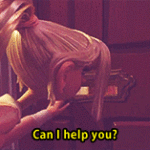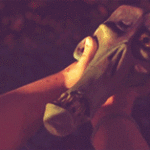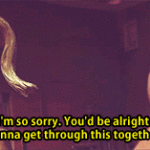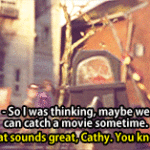So, how do you start this sort of thing? Oh, right. Spoiler warning: No, wait, actually the gifs have already spoiled it for you so…
Now. Let’s talk about Mitch from ParaNorman, okay. He’s the regular high school jock. Because, you know, apparently quarterback means big muscles and not-so-big brains. And of course he’s totally in love with his car, too. Well, yeah, here’s the thing: ParaNorman is all about twisting clichés and stereotypes and knocking you in the head with them. You think zombies are mindless creatures out to eat your brain? Wrong. Witches are ugly, have a pointy nose and fly around in a broom? Wrong. So you think Mitch is the typical heterosexual jock? Wrong.
But maybe I’m blowing this way out of proportion. I can’t be sure, I haven’t seen every animated film, but, yeah, Mitch is one of the first openly gay characters in an animated film. So what? Well, because ‘animated film’ is stereotypically equated to ‘children’s film,’ that’s what. And, also stereotypically, children aren’t supposed to see controversial things such as queer characters. That’s why this is a big deal. Because it doesn’t happen all the time, it doesn’t even happen often. And in ParaNorman, it did. Sending the message that you don’t have to find niche films to be able to see queer characters represented. They can be in animated (and genre) films, too.
But because you can’t have it all, some people will say that the creators should have mentioned Mitch was gay from the get-go. Because why reveal it in the end when “the audience has developed a real affinity for him/her” already? Why didn’t Laika publicize this fact? I mean, didn’t Pixar and Disney pull this ‘first-(insert here)-character’ card when they came out with Brave and The Princess and the Frog? Why couldn’t have Laika waved ‘the gay thing’ around, too? Because they aren’t brave? Because some parents might not let their children see the film if they knew?
Well, maybe that factors in. But the way they handled the big reveal? It was done in two lines. And then moved on. Some might say they treated it like a punchline to a joke, but like writer/director Chris Butler said, “It was important to us. We were telling a story that was fundamentally about intolerance. We believed that it was important to have the strength of our convictions. And yes, we played it off as a punch line to a joke. But in a sense, that made it all the more potent, I think, because Mitch is just an ordinary guy — and what I wanted to do with the script throughout the story was, first of all, to turn preconceptions on their head.”
The very flippant nature of the reveal is key. Mitch is talking about his boyfriend and it doesn’t matter. It renders his sexual orientation as irrelevant to his over-all character. Straight characters are not build up on the fact of their heterosexuality. So why should it be different for queer ones? Since ParaNorman is basically a film that deals with intolerance and fear of people who are supposedly different, this ties in very neatly, and it’s a very, very awesome thing to see.

Just another WordPress site





